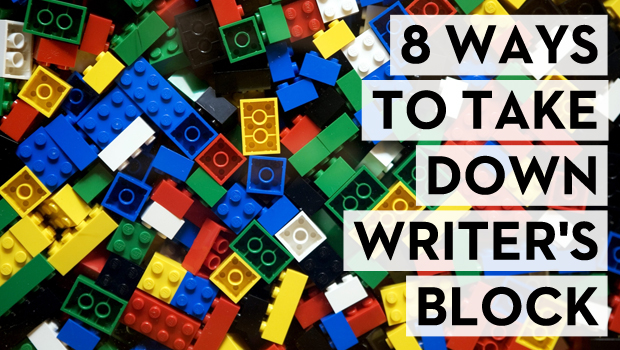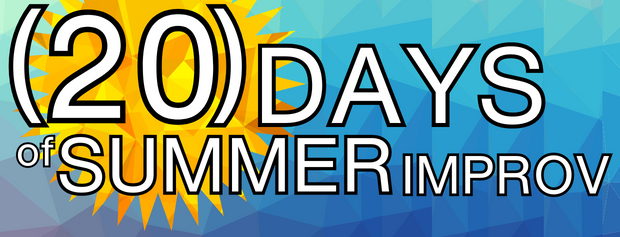We’ve all been there – stuck staring at a blinking cursor, empty notebook page or into the blackness of our souls with no words and no hope of escape. Writer’s block can come on suddenly and attack mercilessly. Here are 8 strategies for dealing with the demon:
1. Input So You Can Output
After finishing a slew of projects, closing a show or just having a rough month at work, your creative well might feel bone-dry. Try making a list of the media and writing you’ve taken in over the past few months. Have you been ignoring books, movies and live shows in favor of YouTube videos, Real Housewives and Buzzfeed lists? You might need to input more aspirational work before you can get started on your own projects again. See an improv show or crack open a new novel – taking in the art of others can help invigorate your own.
Here’s a free one: watch Blackfish and read it as Inglorious Bastards for whales. You’re welcome.
2. Exercise. Or Take a Shower. Or Be an Overachiever and Do Both
Some people have great ideas in the middle of a 10-mile run. Others get inspired in downward dog. Then there are those of us who just need to stand up and do a few stretches to get around a mental road block. Like it or not, changing your physical position can stimulate your brain and give you a solution to that Act Two problem when you actually think you’re worrying about how terrible those squats are feeling. Bodies and minds are weird that way.
And after your workout, take a shower. Keeping clean is just good life advice in general, but many authors have spoken out about having an “a-ha!” moment while sudsing up.
Pros: You are fit, clean and creative.
Cons: No one likes a show-off.
3. Take it Easy on Yourself in the Beginning
Hemingway was famously quoted as telling writers to “write drunk; edit sober.” You can take this literally, as he did, or you can read it to mean that you should give yourself a break mentally on a first draft. Rather than castigating yourself for choosing the wrong word or writing a corny joke, just focus on getting the words down on the page (drunkenly). Save the judgment for the sober process of rewriting, when things DO actually have to improve.
Or, take it literally.
4. Limit Your Choices
Sitting down at a computer and having to choose any idea out of the ether to begin with can be terrifying. Too many choices! How to make the best one? What if I choose something that ends up sucking and wasting my time and then I never get anywhere in my career? You know, reasonable and helpful thoughts like that.
Giving yourself some parameters can do wonders for an anxious mind. Instead of a sketch about literally any topic in the world, decide you’re writing about a family reunion. Rather than spend hours making lists of joke topics, challenge yourself to make your terrifyingly banal coworkers funny. Just like babies, sometimes creativity needs limits to truly grow*.
*Disclaimer: I know nothing about babies.
5. Switch Up the Medium
Twitter might not be an art (yet), but it can be a block-breaker when you’ve been laboring over the final scene in your extremely dramatic play about the Budweiser Clydesdales. Try a switch from prose to haikus, sketch to short stories, or Twitter to novels (the rarest switch). Creating a story or comedy bit in a different mode can make all the difference.
Also, nothing gets work done on a secondary project faster than an impending deadline on a primary one. If you have five projects going at once, at least the least important one is getting some love.
6. Establish a New Routine
I know. It’s awesome writing in your pajamas while lying totally prone in your bed. But if you were sitting in the library or a coffee shop where other people could potentially see your computer screen, would you have spent those two hours Googling audio clips and practicing your Esperanto? Probably not.
Just like moving to a new city can be creatively invigorating, so can writing in a new place or at a different time. Internet programs like Freedom can also help you hold yourself accountable for chunks of time. You can block the internet connection for a set period to get distraction-free writing done. Challenge yourself to complete a project before the internet magically returns. Don’t worry-- your high school classmates’ sonograms will still be on Facebook when you come back.
7. Deny That Writer's Block Even Exists
Google “quotes about writer’s block,” and you’ll find a slew of famous authors who just straight-up refuse to acknowledge that it even exists. If you don’t believe in something, seems to be the reasoning, it can’t take you down.
Like zombies. Or the devil. Or your boss’ ability to check your internet history.
And if all else fails...
8. Weep Until the Neighbors Hear You, Then Watch 17.3 Straight Hours of Netflix
Crying is cathartic, after all. As is watching all four seasons of Mighty Morphin Power Rangers in a weekend.
Caitlin Kunkel is a writer and director as well as a faculty member at The Second City Training Center. She is currently living in Portland, OR, where she studies ironic yoga and the role cat jokes play in the universe. Read more of her musings @KunkelTron or at the more professionally-named www.caitlinkunkel.com.

 Shows & Tickets
Shows & Tickets  Chicago Venue Info
Chicago Venue Info  Classes & Education
Classes & Education  Second City Works
Second City Works  Second City Network
Second City Network  Our Legacy
Our Legacy 













